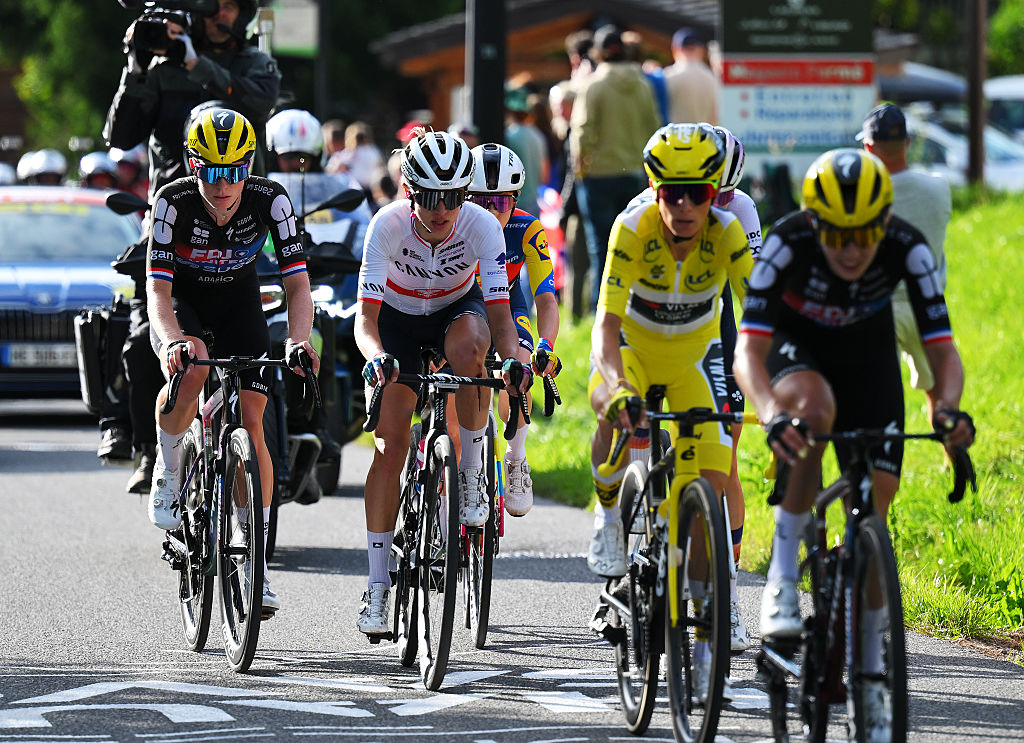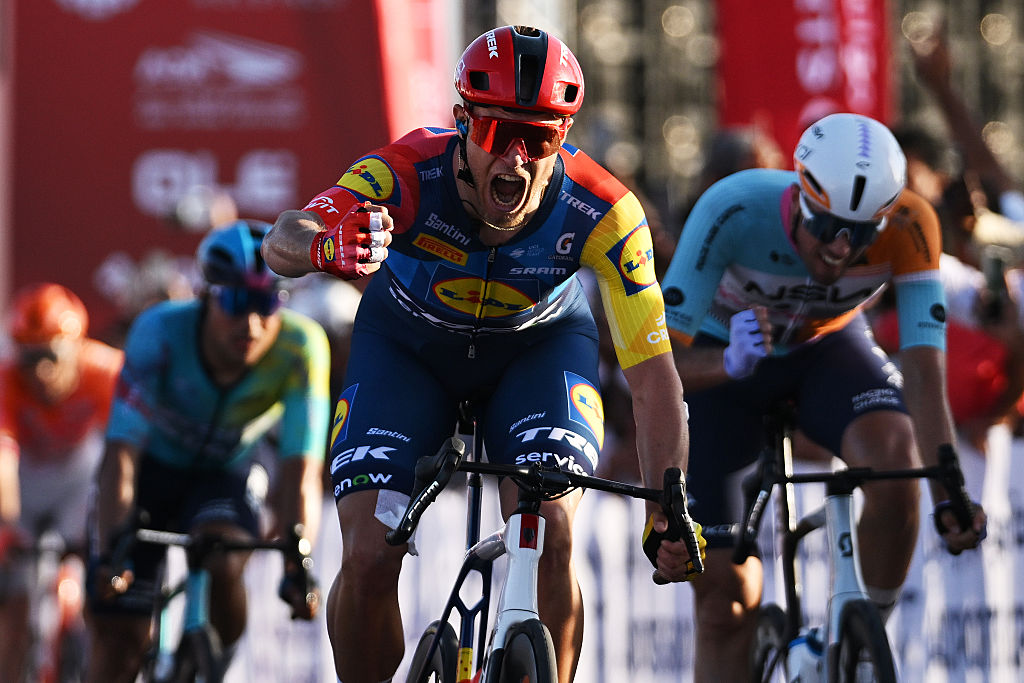'The biggest priority is to be healthy' - Demi Vollering, Pauline Ferrand-Prévot respond to questions about rider weight at the Tour de France Femmes
'Just believe that if you have the power and that you train hard, that you can make it' former Tour winner on balancing health, training and racing

The latest race content, interviews, features, reviews and expert buying guides, direct to your inbox!
You are now subscribed
Your newsletter sign-up was successful
Pauline Ferrand-Prévot and Demi Vollering faced a series of questions regarding rider weight at the Tour de France Femmes, with both athletes explaining that being healthy was the most important priority for high-level competition.
Immediately following the podium ceremony – where Visma-Lease a Bike leader Ferrand-Prévot was crowned the overall champion and Vollering stood in the runner-up spot – the pair responded to questions at the post-race press conference, where members of the media asked about how they felt about weight vs performance, a topic that surfaced several times during the nine-day race.
"The biggest priority is to be healthy," FDJ-Suez leader Vollering said, noting that she was sick following the Tour de Suisse and chose to recover fully rather than focus too much on reaching a target weight.
"I mean, for me, it's not too difficult, because I don't have problems, and in my eyes, health is always the most important," Vollering told the media assembled in the press conference when asked about the mental health implications of the weight questions, explaining that she has always felt positive and proud of her body and her strength and that she aims to lead the younger generation of athletes by example.
"I can show girls that you don't have to be super, super skinny, and that you can just believe that if you have the power and that you train hard, that you can make it," Vollering said.
Vollering has had a highly successful career as an all-rounder who can win in the spring Classics and the Grand Tours, and she is one of the most powerful climbers in the peloton.
"I hope I can be back there. I mean, for me, it's also kind of a nice challenge to keep going for big wins in the mountains with the body I have. So, I think for me, personally, it's not difficult, but I know that a lot of riders in general struggle with this, but for me, it's not the case, but I just really hope that young girls now don't think that they need to be super skinny to ride in the mountains."
This line of questioning arose in the post-race press conference after her FDJ-Suez directeur sportif, Lars Boom, was said to have noted the difference in body types and climbing performances between Vollering and Ferrand-Prévot with members of the media.
Ferrand-Prévot returned to road racing this year after a sparkling mountain bike career, where she won the Olympic gold last summer. She had a strong spring Classics season where she won Paris-Roubaix. She took 10 weeks off to recover from a minor injury and then to train specifically for the Tour de France Femmes.
She came into the French Grand Tour as a favourite to win the overall title, had already spoken openly about her training strategy, which included losing weight and training at altitude in the mountains, including two trips to visit the Col de la Madeleine.
At that time, she explained, "I am a bit lighter than in the Classics season, where you need to climb for two to three minutes, and you have to have some power. Now, for the long climbs, I need good watts/kg, so I had to lose some weight. I am quite familiar with it because it is the way I've been doing it for the season.
"When I like to have one goal, I like to have a race weight for this event. I know that I can't be super skinny all season long, and I don't find it very healthy, so I prefer that when I have a goal to lose weight slowly, to be at the good weight for the good moment."
Ferrand-Prévot enjoyed a wildly successful nine days of racing at her first Tour, beginning with a third place in Plumelec as her teammate Marianne Vos took yellow. She went on to grab three more top 10 placings, moving up to second overall before winning the final alpine two stages atop the Madeleine and at Châtel, where she soared into yellow, making significant time differences on her GC rivals.
In Sunday's post-race press conference after winning the race, she was asked about her decision to reduce her weight specifically for this event.
"Everyone prepares the way they want," she replied. "For Roubaix, I was much heavier because I knew that I needed to be heavier to have some power on the flat, and for this race, I knew that I had to climb one and a half hours, so I tried to make the most of it.
"You need to adapt to the terrain you have, and I also know that this shape I have now, I will not keep it forever. It’s just for the Tour de France. It’s also my job to be the best as possible, and we know that it’s an endurance sport, so if you need to climb, you have to have a good w/kg. So, yes, I made the choice, and I work hard for it.
"I don’t want to stay like this because I know it’s not 100% healthy, but we also had a good plan with the nutritionist of the team, and everything is in control. I didn’t do extreme, and I still had power left after nine days of racing."
She said she understands that any discussions about weight and performance are a sensitive subject and that it was important for her to be educated on both her nutrition options and performance goals.
Another French rider, Cédrine Kerbaol, was also in the GC battle at the Tour de France Femmes, finishing eighth overall. The Breton racer made headlines earlier in the race, emerging as a spokeswoman on the topic of periods, health and performance.
Kerbaol, who races for EF Education-Oatly, has a diploma in nutrition studies, and recently spoke out about cycling having a "dangerous moment" with pressure to lose weight for races, risking negative side effects to the riders' health, such as period loss.
She created an Instagram account, @f.e.e.d_powr (Fuelling for Endurance, Energy, and Durability), to raise awareness and speak out on the topic, and hopes the account can serve as an example to others, rather than shaming them.
Her teammates, Olympic champion Kristen Faulkner, and Magdeleine Vallieres, have both featured on the @f.e.e.d_powr feed to tell their stories.
"I wasn't expecting to speak about it yesterday, but there had been a lot of positive response from a lot of people who have the same ideas but don't know if others share them too," she said at the start of stage 6 of the Tour in Clermont-Ferrand. "I think it has started to break the taboo, and that can have a positive prevention effect."
Subscribe to Cyclingnews for unlimited access to our Tour de France Femmes coverage. Don't miss any of the breaking news, reports, and analysis from one of the biggest women's stage races of the season. Find out more.

Kirsten Frattini has been the Editor of Cyclingnews since December 2025, overseeing editorial operations and output across the brand and delivering quality, engaging content.
She manages global budgets, racing & events, production scheduling, and contributor commissions, collaborating across content sections and teams in the UK, Europe, North America, and Australia to ensure audience and subscription growth across the brand.
Kirsten has a background in Kinesiology and Health Science. She has been involved in cycling from the community and grassroots level to professional cycling's biggest races, reporting on the WorldTour, Spring Classics, Tours de France, World Championships and Olympic Games.
- Dani OstanekSenior News Writer
- Simone GiulianiAustralia Editor
You must confirm your public display name before commenting
Please logout and then login again, you will then be prompted to enter your display name.
